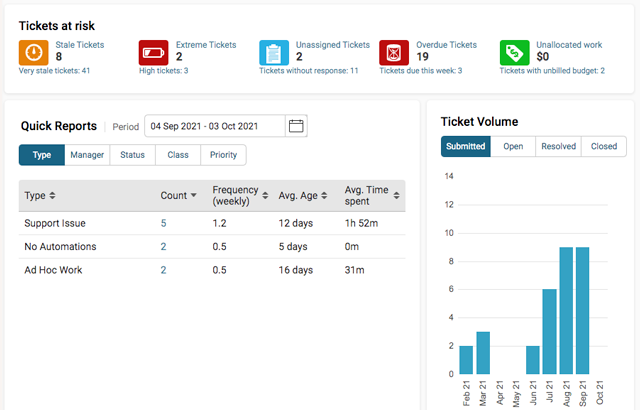Ticket Dashboard 101: What Your Service Business Needs To Know
Anyone who has worked in a client-supporting role knows that a big part of the job is finding solutions to client issues or requests. One way to do this quickly and efficiently is with the help of a ticketing system.
Service businesses use ticketing systems to receive, manage and respond to client requests. These systems create a ticket for each new request — submitted by email, phone call or sometimes through a ticketing interface. The system will then record all the relevant information about the request and create a record that employees can reference as the issue is resolved.
But internal support teams know not every ticketing system is built the same, and successfully managing client request tickets can often depend on the features their platform may offer. One of the most important features a team will use is the ticket dashboard.
In this article, we’ll break down everything you need to know about ticket dashboards to better support your clients. That includes:
What Is a Ticket Dashboard?
A ticket dashboard collects all client tickets and provides a centralized place for support teams to view and manage the issues and requests. The dashboard provides a quick, visual overview of ticket status, ticket volume and overall team performance.
Having these insights available in one dashboard can give leadership the data they need to easily make informed decisions about employee utilization and client relationships and can help pinpoint common issues that may need to be addressed company-wide.
Who Uses a Ticket Dashboard?
Any business serving customers or clients can benefit from a ticketing system and that can range from professional services businesses to retail to your internet provider. If a company sells a product or offers a service, they probably also have some kind of ticketing system to manage client questions or issues — although the complexity of those systems can vary greatly from business to business.
The people in those companies that are most likely to use a ticket dashboard are support teams and other client-facing roles. These individuals are likely the ones managing new requests and communicating solutions with clients and they will benefit from having a dashboard to reference for details about a specific request or the status of assigned tickets.
Another group that will often use a ticket dashboard is company leadership. While they may not be managing the tickets or responding to clients themselves, a ticket dashboard can provide important insights into team performance and ongoing client concerns to help guide leadership decisions.
With access to the detailed information in the dashboard, leadership can determine if their support team needs additional employees to meet increased ticket demand. They could also use the ticket dashboard to see how long their team takes to resolve tickets — helping determine the amount of billable time each client requires and whether or not the client relationship is still profitable.
What Are the Benefits of a Ticket Dashboard?
Not only do ticketing systems give your support team a better way to track calls, emails and other client requests, but they also help boost your internal efficiency with better organization, communication and record-keeping. Below we’ll cover some of the benefits a ticketing system with a robust ticket dashboard can bring to your support team and your business overall.
- Faster Ticket Resolution
- Reduced Ticket Backlog
- Greater Organization
- More Personalized Support
- Better Communication
Faster Ticket Resolution
No client wants to be kept waiting. The faster issues can be resolved, the better. Using a ticket dashboard helps track tickets in progress, including ones that are pending or overdue. This helps leadership determine whether there are performance gaps, where those gaps are and what to do about them.
Automated ticketing systems can also route calls to available support team members and instantly provide historical client data to help resolve the issue quickly. This eliminates time spent routing calls and getting reps up to speed since they already have the details in front of them.
Reduced Ticket Backlog
With automated ticket allocation, your team will spend less time on mundane tasks like call routing or data entry — providing more time to reduce any ticket backlog. Since a ticketing dashboard gives management a bird’s-eye view of overdue tickets, they can take action if open tickets begin to accumulate.
Reducing or eliminating support ticket backlog will reduce the chances of support staff burnout and will help your team respond quickly to new client requests — creating a better client experience overall.
Greater Organization
If your company has a high volume of support tickets, this benefit is especially important. A ticket dashboard helps you organize and track tickets for the entire customer service department. A centralized dashboard means support staff can easily reference past tickets, client records and communication histories to help solve new client requests with minimal effort.
Advanced ticket dashboards also allow teams to label and prioritize tickets based on urgency, assignee, request type and more — making it easier to identify patterns and address recurring issues.
More Personalized Support
Automated routing and better workload management means your support team will have more time to deal with issues on a case-by-case basis. That means they can offer more personalized solutions to the client’s problem.
Your clients feel more valued when your employees can spend time addressing their concerns, and in turn, they’ll be more likely to leave the interaction with a positive impression of your business. That experience will make them more likely to stay loyal to your business and recommend your services to others.
Better Communication
Your company probably has multiple support channels people can reach you through — email, phone, social media, chat and more. If one customer is communicating with you over multiple channels for the same issue, that can get hard to handle.
Luckily, an advanced ticketing system can consolidate all communication from a client into one client record, regardless of how they’re reaching out to you.
Top Ticket Dashboard Features for Service Businesses
Finding the right ticketing system to manage your client requests can be difficult, especially when there are so many variables to consider when selecting the best fit for your business. Beyond accounting for pricing and integrations, there are some critical ticket dashboard features you’ll want to consider to get the most out of your platform.
- Ticket Prioritization: You’ll want a tickets dashboard that allows you to categorize and organize your open customer tickets by priority. You can see which tickets have gone “stale” or “very stale” and respond quickly to tickets before they become overdue. Tickets that are urgent and must be resolved quickly can be tagged accordingly to make sure they get the attention they need.
- Ticket Volume Reporting: Ticket volume charts show the number of support tickets your team receives in a set period. Access to this data shows recurring patterns and can alert you to potential backlogs, so your team can proactively address the concerns.
- Team Performance Insights: A ticket dashboard with team performance data makes it easy to analyze staff performance, see how much time is spent on resolving tickets and how much has been billed to your client to better understand internal resourcing or how much time clients are taking up of your staff’s time.

Accelo's ticket dashboard provides a quick overview of all client support activities.
Unsure how your business could best use this request management feature? Discover four ways to use ticketing software for a service business.
